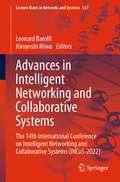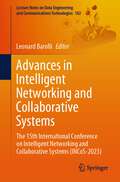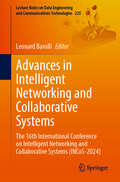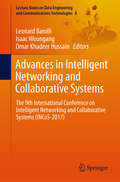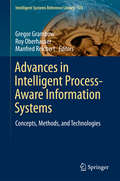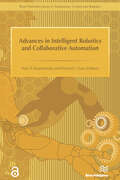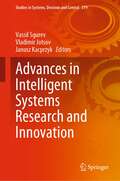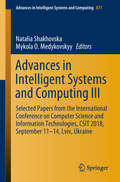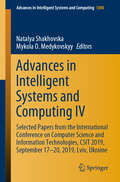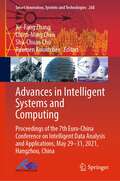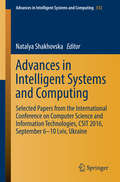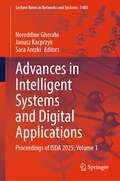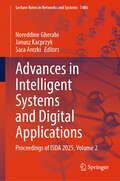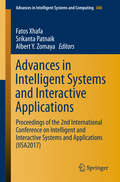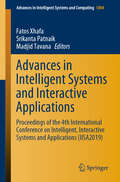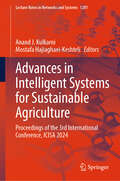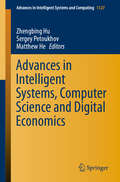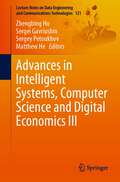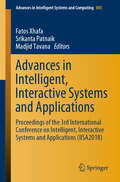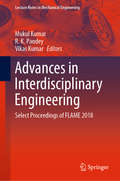- Table View
- List View
Advances in Intelligent Networking and Collaborative Systems: The 14th International Conference on Intelligent Networking and Collaborative Systems (INCoS-2022) (Lecture Notes in Networks and Systems #527)
by Leonard Barolli Hiroyoshi MiwaWith the fast development of the Internet, we are experiencing a shift from the traditional sharing of information and applications as the main purpose of the Web to an emergent paradigm, which locates people at the very center of networks and exploits the value of people's connections, relations, and collaboration. Social networks are also playing a major role in the dynamics and structure of intelligent Web-based networking and collaborative systems. Virtual campuses, virtual communities, and organizations strongly leverage intelligent networking and collaborative systems by a great variety of formal and informal electronic relations, such as business-to-business, peer-to-peer, and many types of online collaborative learning interactions, including the emerging e-learning systems. This has resulted in entangled systems that need to be managed efficiently and in an autonomous way. In addition, latest and powerful technologies based on grid and wireless infrastructure as well as cloud computing are currently enhancing collaborative and networking applications a great deal but also facing new issues and challenges. The principal purpose of the research and development community is to stimulate research that will lead to the creation of responsive environments for networking and, at longer-term, the development of adaptive, secure, mobile, and intuitive intelligent systems for collaborative work and learning. The aim of the book “Advances on Intelligent Networking and Collaborative Systems” is to provide latest research findings, innovative research results, methods, and development techniques from both theoretical and practical perspectives related to intelligent social networks and collaborative systems, intelligent networking systems, mobile collaborative systems, secure intelligent cloud systems, and so on as well as to reveal synergies among various paradigms in such a multi-disciplinary field intelligent collaborative systems.
Advances in Intelligent Networking and Collaborative Systems: The 15th International Conference on Intelligent Networking and Collaborative Systems (INCoS-2023) (Lecture Notes on Data Engineering and Communications Technologies #182)
by Leonard BarolliWith the fast development of the Internet, we are experiencing a shift from the traditional sharing of information and applications as the main purpose of the Web to an emergent paradigm, which locates people at the very center of networks and exploits the value of people's connections, relations, and collaboration. Social networks are also playing a major role in the dynamics and structure of intelligent Web-based networking and collaborative systems. Virtual campuses, virtual communities, and organizations strongly leverage intelligent networking and collaborative systems by a great variety of formal and informal electronic relations, such as business-to-business, peer-to-peer, and many types of online collaborative learning interactions, including the emerging e-learning systems. This has resulted in entangled systems that need to be managed efficiently and in an autonomous way. In addition, latest and powerful technologies based on grid and wireless infrastructure as well as cloud computing are currently enhancing collaborative and networking applications a great deal but also facing new issues and challenges. The principal purpose of the research and development community is to stimulate research that will lead to the creation of responsive environments for networking and, at longer term, the development of adaptive, secure, mobile, and intuitive intelligent systems for collaborative work and learning. The aim of the book is to provide latest research findings, innovative research results, methods and development techniques from both theoretical and practical perspectives related to intelligent social networks and collaborative systems, intelligent networking systems, mobile collaborative systems, secure intelligent cloud systems, etc., as well as to reveal synergies among various paradigms in such a multi-disciplinary field intelligent collaborative systems.
Advances in Intelligent Networking and Collaborative Systems: The 16th International Conference on Intelligent Networking and Collaborative Systems (INCoS-2024) (Lecture Notes on Data Engineering and Communications Technologies #225)
by Leonard BarolliThis book provides latest research findings, innovative research results, methods and development techniques from both theoretical and practical perspectives related to intelligent social networks and collaborative systems, intelligent networking systems, mobile collaborative systems and secure intelligent cloud systems as well as reveals synergies among various paradigms in such a multi-disciplinary field of intelligent collaborative systems. With the fast development of the Internet, there is a shift from the traditional sharing of information and applications as the main purpose of the Web to an emergent paradigm, which locates people at the very center of networks and exploits the value of people's connections, relations and collaboration. Social networks are also playing a major role in the dynamics and structure of intelligent Web-based networking and collaborative systems. Virtual campuses, virtual communities and organizations strongly leverage intelligent networking and collaborative systems by a great variety of formal and informal electronic relations, such as business-to-business, peer-to-peer and many types of online collaborative learning interactions, including the emerging e-learning systems. This has resulted in entangled systems that need to be managed efficiently and in an autonomous way. In addition, latest and powerful technologies based on grid and wireless infrastructure as well as cloud computing are currently enhancing collaborative and networking applications a great deal but also facing new issues and challenges. The principal purpose of the research and development community is to stimulate research that will lead to the creation of responsive environments for networking and, at longer-term, the development of adaptive, secure, mobile and intuitive intelligent systems for collaborative work and learning.
Advances in Intelligent Networking and Collaborative Systems: The 9th International Conference on Intelligent Networking and Collaborative Systems (INCoS-2017) (Lecture Notes on Data Engineering and Communications Technologies #8)
by Isaac Woungang Leonard Barolli Omar Khadeer HussainThe aim of this book is to provide the latest research findings, innovative research results, methods and development techniques from both theoretical and practical perspectives related to intelligent social networks and collaborative systems, intelligent networking systems, mobile collaborative systems, secure intelligent cloud systems, etc. , and to reveal synergies among various paradigms in the multi-disciplinary field of intelligent collaborative systems. It presents the Proceedings of the 9th International Conference on Intelligent Networking and Collaborative Systems (INCoS-2017), held on August 24-26, 2017 in Toronto, Canada. With the rapid evolution of the Inte rnet, we are currently experiencing a shift from the traditional sharing of information and applications as the main purpose of the Web to an emergent paradigm that puts people at the very centre of networks and exploits the value of people's connections, relations and collaborations. Social networks are also playing a major role in the dynamics and structure of intelligent Web-based networking and collaborative systems. Virtual campuses, virtual communities and organi zations effectively leverage intelligent networking and collaborative systems by tapping into a broad range of formal and informal electronic relations, such as business-to-business, peer-to-peer and many types of online collaborative learning interactions, including the emerging e-learning systems. This has resulted in entangled systems that need to be managed efficiently and autonomously. In addition, the latest and powerful technologies based on Grid and wireless infrastructure as well as Cloud computing are now greatly enhancing collaborative and networking applications, but are also facing new issues and challenges. The principal objective of the research and development community is to stimulate research that leads to the creation of responsive environments for networking and, in the longer-term, the development of adaptive, secure, mobile, and intuitive intelligent systems for collaborative work and learning.
Advances in Intelligent Process-Aware Information Systems: Concepts, Methods, and Technologies (Intelligent Systems Reference Library #123)
by Manfred Reichert Gregor Grambow Roy OberhauserThis book provides a state-of-the-art perspective on intelligent process-aware information systems and presents chapters on specific facets and approaches applicable to such systems. Further, it highlights novel advances and developments in various aspects of intelligent process-aware information systems and business process management systems. Intelligence capabilities are increasingly being integrated into or created in many of today's software products and services. Process-aware information systems provide critical computing infrastructure to support the various processes involved in the creation and delivery of business products and services. Yet the integration of intelligence capabilities into process-aware information systems is a non-trivial yet necessary evolution of these complex systems. The book's individual chapters address adaptive process management, case management processes, autonomically-capable processes, process-oriented information logistics, process recommendations, reasoning over process models, process portability, and business process intelligence. The primary target groups are researchers and PhD/Master students in the field of information systems.
Advances in Intelligent Robotics and Collaborative Automation (River Publishers Series In Automation, Control And Robotics Ser.)
by Yuriy Kondratenko Richard DuroThis book provides an overview of a series of advanced research lines in robotics as well as of design and development methodologies for intelligent robots and their intelligent components. It represents a selection of extended versions of the best papers presented at the Seventh IEEE International Workshop on Intelligent Data Acquisition and Advanced Computing Systems: Technology and Applications IDAACS 2013 that were related to these topics. Its contents integrate state of the art computational intelligence based techniques for automatic robot control to novel distributed sensing and data integration methodologies that can be applied to intelligent robotics and automation systems. The objective of the text was to provide an overview of some of the problems in the field of robotic systems and intelligent automation and the approaches and techniques that relevant research groups within this area are employing to try to solve them.The contributions of the different authors have been grouped into four main sections:• Robots• Control and Intelligence• Sensing• Collaborative automationThe chapters have been structured to provide an easy to follow introduction to the topics that are addressed, including the most relevant references, so that anyone interested in this field can get started in the area.
Advances in Intelligent System and Smart Technologies: Proceedings of I2ST’23 (Lecture Notes in Networks and Systems #826)
by Ali Ismail Awad Mohamed Bahaj Anand Nayyar Noredine GherabiThis book is a collection of high-quality peer-reviewed research papers presented at The International Conference on Intelligent Systems and Smart Technologies (I2ST’23) held at the Faculty of Science and Technology of Hassan First University, Morocco, on January 17–18, 2023. I2ST'23 is a forum for presenting new advances and research results in the fields of information, communication, and smart technologies. The book discusses significant issues relating to machine learning, smart technologies, and data analytics. The main and distinctive topics covered are: I) AI& Intelligent, II) Systems Smart Technologies, III) Communications and Networking, IV) Software Engineering & Web Applications, V) Information Technology, and VI) Software Engineering & Web Applications.
Advances in Intelligent Systems Research and Innovation (Studies in Systems, Decision and Control #379)
by Janusz Kacprzyk Vassil Sgurev Vladimir JotsovThis book represents the experience of successful researchers from four continents on a broad range of intelligent systems, and it hints how to avoid anticipated conflicts and problems during multidisciplinary innovative research from Industry 4.0 and/or Internet of Things through modern machine learning, and software agent applications to open data science big data/advance analytics/visual analytics/text mining/web mining/knowledge discovery/deep data mining issues. The considered intelligent part is essential in most smart/control systems, cyber security, bioinformatics, virtual reality, robotics, mathematical modelling projects, and its significance rapidly increases in other technologies. Theoretical foundations of fuzzy sets, mathematical and non-classical logic also are rapidly developing.
Advances in Intelligent Systems and Computing II: Selected Papers from the International Conference on Computer Science and Information Technologies, CSIT 2017, September 5-8 Lviv, Ukraine (Advances in Intelligent Systems and Computing #689)
by Natalia Shakhovska Volodymyr StepashkoThis book reports on new theories and applications in the field of intelligent systems and computing. It covers computational and artificial intelligence methods, as well as advances in computer vision, current issues in big data and cloud computing, computation linguistics, and cyber-physical systems. It also reports on data mining and knowledge extraction technologies, as well as central issues in intelligent information management. Written by active researchers, the respective chapters are based on papers presented at the International Conference on Computer Science and Information Technologies (CSIT 2017), held on September 5–8, 2017, in Lviv, Ukraine; and at two workshops accompanying the conference: one on inductive modeling, jointly organized by the Lviv Polytechnic National University and the National Academy of Science of Ukraine; and another on project management, which was jointly organized by the Lviv Polytechnic National University, the International Project Management Association, the Ukrainian Project Management Association, the Kazakhstan Project Management Association, and Nazarbayev University. Given its breadth of coverage, the book provides academics and professionals with extensive information and a timely snapshot of the field of intelligent systems, and is sure to foster new discussions and collaborations among different groups.
Advances in Intelligent Systems and Computing III: Selected Papers from the International Conference on Computer Science and Information Technologies, CSIT 2018, September 11-14, Lviv, Ukraine (Advances in Intelligent Systems and Computing #871)
by Natalia Shakhovska Mykola O. MedykovskyyThis book reports on new theories and applications in the field of intelligent systems and computing. It covers computational and artificial intelligence methods, as well as advances in computer vision, current issues in big data and cloud computing, computation linguistics, and cyber-physical systems. It also reports on data mining and knowledge extraction technologies, as well as central issues in intelligent information management.Written by active researchers, the respective chapters are based on papers presented at the International Conference on Computer Science and Information Technologies (CSIT 2018), held on September 11–14, 2018, in Lviv, Ukraine, and jointly organized by the Lviv Polytechnic National University, Ukraine, the Kharkiv National University of Radio Electronics, Ukraine, and the Technical University of Lodz, Poland, under patronage of Ministry of Education and Science of Ukraine. Given its breadth of coverage, the book provides academics and professionals with extensive information and a timely snapshot of the field of intelligent systems, and is sure to foster new discussions and collaborations among different groups.
Advances in Intelligent Systems and Computing IV: Selected Papers from the International Conference on Computer Science and Information Technologies, CSIT 2019, September 17-20, 2019, Lviv, Ukraine (Advances in Intelligent Systems and Computing #1080)
by Natalya Shakhovska Mykola O. MedykovskyyThis book reports on new theories and applications in the field of intelligent systems and computing. It covers computational and artificial intelligence methods, as well as advances in computer vision, current issues in big data and cloud computing, computation linguistics, and cyber-physical systems. It also reports on important topics in intelligent information management. Written by active researchers, the respective chapters are based on selected papers presented at the XIV International Scientific and Technical Conference on Computer Science and Information Technologies (CSIT 2019), held on September 17–20, 2019, in Lviv, Ukraine. The conference was jointly organized by the Lviv Polytechnic National University, Ukraine, the Kharkiv National University of Radio Electronics, Ukraine, and the Technical University of Lodz, Poland, under patronage of Ministry of Education and Science of Ukraine. Given its breadth of coverage, the book provides academics and professionals with extensive information and a timely snapshot of the field of intelligent systems, and is sure to foster new discussions and collaborations among different groups.
Advances in Intelligent Systems and Computing V: Selected Papers from the International Conference on Computer Science and Information Technologies, CSIT 2020, September 23-26, 2020, Zbarazh, Ukraine (Advances in Intelligent Systems and Computing #1293)
by Natalya Shakhovska Mykola O. MedykovskyyThis book reports on new theories and applications in the field of intelligent systems and computing. It covers cutting-edge computational and artificial intelligence methods, advances in computer vision, big data, cloud computing, and computation linguistics, as well as cyber-physical and intelligent information management systems. The respective chapters are based on selected papers presented at the workshop on intelligent systems and computing, held during the International Conference on Computer Science and Information Technologies, CSIT 2020, which was jointly organized on September 23-26, 2020, by the Lviv Polytechnic National University, Ukraine, the Kharkiv National University of Radio Electronics, Ukraine, and the Technical University of Lodz, Poland, under patronage of Ministry of Education and Science of Ukraine.Given its breadth of coverage, the book provides academics and professionals with extensive information and a timely snapshot of the field of intelligent systems, and is sure to foster new discussions and collaborations among different groups.
Advances in Intelligent Systems and Computing: Proceedings of the 7th Euro-China Conference on Intelligent Data Analysis and Applications, May 29–31, 2021, Hangzhou, China (Smart Innovation, Systems and Technologies #268)
by Shu-Chuan Chu Roumen Kountchev Chien-Ming Chen Jie-Fang ZhangThe book is a collection of high-quality research papers presented at 7th Euro-China Conference on Intelligent Data Analysis and Applications, hosted by Communication University of Zhejiang, China and technically co-sponsored by Shandong University of Science and Technology, China; Zhejiang Lab, China; and Fujian University of Technology, China. The book covers areas like intelligent data analysis, computational intelligences, signal processing, and all associated applications of artificial intelligence.
Advances in Intelligent Systems and Computing: Selected Papers from the International Conference on Computer Science and Information Technologies, CSIT 2016, September 6-10 Lviv, Ukraine (Advances in Intelligent Systems and Computing #512)
by Natalya ShakhovskaThe book reports on new theories and applications in the field of intelligent systems and computing. It covers computational and artificial intelligence methods, as well as advances in computer vision, current issue in big data and cloud computing, computation linguistics, cyber-physical systems as well as topics in intelligent information management. Written by active researchers, the different chapters are based on contributions presented at the workshop in intelligent systems and computing (ISC), held during CSIT 2016, September 6-9, and jointly organized by the Lviv Polytechnic National University, Ukraine, the Kharkiv National University of Radio Electronics, Ukraine, and the Technical University of Lodz, Poland, under patronage of Ministry of Education and Science of Ukraine. All in all, the book provides academics and professionals with extensive information and a timely snapshot of the field of intelligent systems, and it is expected to foster new discussions and collaborations among different groups.
Advances in Intelligent Systems and Digital Applications: Proceedings of ISDA 2025, Volume 1 (Lecture Notes in Networks and Systems #1485)
by Janusz Kacprzyk Noreddine Gherabi Sara ArezkiThis book serves as a comprehensive reference, providing cutting-edge knowledge on intelligent systems and digital applications. It covers theoretical foundations and significant issues in machine learning, deep learning, and data analytics. Each chapter concludes with a detailed bibliography for further in-depth reading.Divided into two sections—Foundations and Applications—the book offers a complete source of information on its theme. The chapters include concepts, algorithms, figures, graphs, and tables to enhance readability. The target audience includes researchers, practitioners, and postgraduate and graduate students developing or utilizing artificial intelligence algorithms in various applications.
Advances in Intelligent Systems and Digital Applications: Proceedings of ISDA 2025, Volume 2 (Lecture Notes in Networks and Systems #1486)
by Janusz Kacprzyk Noreddine Gherabi Sara ArezkiThis book serves as a comprehensive reference, providing cutting-edge knowledge on intelligent systems and digital applications. It covers theoretical foundations and significant issues in machine learning, deep learning, and data analytics. Each chapter concludes with a detailed bibliography for further in-depth reading.Divided into two sections—Foundations and Applications—the book offers a complete source of information on its theme. The chapters include concepts, algorithms, figures, graphs, and tables to enhance readability. The target audience includes researchers, practitioners, and postgraduate and graduate students developing or utilizing artificial intelligence algorithms in various applications.
Advances in Intelligent Systems and Interactive Applications: Proceedings of the 2nd International Conference on Intelligent and Interactive Systems and Applications (IISA2017) (Advances in Intelligent Systems and Computing #686)
by Albert Y. Zomaya Fatos Xhafa Srikanta PatnaikThis book presents research papers from diverse areas on novel Intelligent Systems and Interactive Systems and Applications. It gathers selected research papers presented at the 2nd International Conference on Intelligent and Interactive Systems and Applications (IISA2017), which was held on June 17-18, 2017 in Beijing, China. Interactive Intelligent Systems (IIS) are systems that interact with human beings, media or virtual agents in intelligent computing environments. The emergence of Big Data and the Internet of Things have now opened new opportunities in both academic and industrial research for the successful design and development of intelligent interactive systems. This book explores how novel interactive systems can be used to overcome various challenges and limitations previously encountered by human beings by combining machine learning algorithms and the analysis of recent trends. The book presents 125 contributions, which have been categorized into seven sections, namely: i) Autonomous Systems; ii) Pattern Recognition and Vision Systems; iii) E-Enabled Systems; iv) Mobile Computing and Intelligent Networking; v) Internet and Cloud Computing; vi) Intelligent Systems, and vii) Various Applications. It not only offers readers extensive theoretical information on Intelligent and Interactive Systems, but also introduces them to various applications in different domains.
Advances in Intelligent Systems and Interactive Applications: Proceedings of the 4th International Conference on Intelligent, Interactive Systems and Applications (IISA2019) (Advances in Intelligent Systems and Computing #1084)
by Madjid Tavana Fatos Xhafa Srikanta PatnaikThis edited book is based on the research papers presented at the 4th International Conference on Intelligent, Interactive Systems and Applications (IISA2019), held on June 28–30, 2019 in Bangkok, Thailand. Interactive intelligent systems (IIS) are systems that interact with human beings, media or virtual agents in intelligent computing environments. This book explores how novel interactive systems can intelligently address various challenges and also limitations previously encountered by human beings using different machine learning algorithms, and analyzes recent trends. The book includes contributions from diverse areas of IIS, here categorized into seven sections, namely i) Intelligent Systems; ii) Autonomous Systems; iii) Pattern Recognition and Computer Vision; iv) E-Enabled Systems; v) Internet & Cloud Computing; vi) Mobile & Wireless Communication; and vii) Various Applications. It not only presents theoretical knowledge on the intelligent and interactive systems but also discusses various applications pertaining to different domains.
Advances in Intelligent Systems for Sustainable Agriculture: Proceedings of the 3rd International Conference, ICISA 2024 (Lecture Notes in Networks and Systems #1201)
by Anand J. Kulkarni Mostafa Hajiaghaei-KeshteliThis book presents the select proceedings of the 3rd International Conference on Intelligent Systems and Applications 2023. The theme of this conference is ‘Intelligent Systems for Agricultural Applications'. It covers the topics of intelligent systems in multiple aspects such as sustainable crop production, weather prediction, post-harvest management and agro-processing, digitalization and automation of agri equipment, agriculture warehouse and supply chain management, yield prediction, and quality assessment. The book is useful for researchers and professionals interested in the broad field of artificial intelligence and machine learning.
Advances in Intelligent Systems, Computer Science and Digital Economics (Advances in Intelligent Systems and Computing #1127)
by Sergey Petoukhov Matthew He Zhengbing HuThis book comprises high-quality, refereed research papers presented at the 2019 International Symposium on Computer Science, Digital Economy and Intelligent Systems (CSDEIS2019): The symposium, held in Moscow, Russia, on 4–6 October 2019, was organized jointly by Moscow State Technical University and the International Research Association of Modern Education and Computer Science. The book discusses the state of the art in areas such as computer science and its technological applications; intelligent systems and intellectual approaches; and digital economics and methodological approaches. It is an excellent reference resource for researchers, undergraduate and graduate students, engineers, and management practitioners interested in computer science and its applications in engineering and management.
Advances in Intelligent Systems, Computer Science and Digital Economics II (Advances in Intelligent Systems and Computing #1402)
by Sergey Petoukhov Matthew He Zhengbing HuThis book comprises high-quality refereed research papers presented at The Second International Symposium on Computer Science, Digital Economy and Intelligent Systems (CSDEIS2020), held in Moscow, Russia, on December 18–20, 2020, organized jointly by Moscow State Technical University and the International Research Association of Modern Education and Computer Science. The topics discussed in the book include state-of-the-art papers in computer science and their technological applications; intelligent systems and intellectual approaches; digital economics and methodological approaches. It is an excellent source of references for researchers, graduate students, engineers, management practitioners, and undergraduate students interested in computer science and their applications in engineering and management.
Advances in Intelligent Systems, Computer Science and Digital Economics III (Lecture Notes on Data Engineering and Communications Technologies #121)
by Sergey Petoukhov Matthew He Zhengbing Hu Sergei GavriushinThe book comprises high-quality refereed research papers presented at the Third International Symposium on Computer Science, Digital Economy, and Intelligent Systems (CSDEIS2021), held in Moscow, Russia, on December 25-26, 2021, organized jointly by the Mechanical Engineering Research Institute of the Russian Academy of Sciences,Moscow State Technical University, and the International Research Association of Modern Education and Computer Science. The topics discussed in the book includes state-of-the-art papers in computer science and their technological applications; intelligent systems and intellectual approaches; digital economics and methodological approaches. It is an excellent source of references for researchers, graduate students, engineers, management practitioners, and undergraduate students interested in computer science and its applications in engineering and management.
Advances in Intelligent Systems, Computer Science and Digital Economics IV (Lecture Notes on Data Engineering and Communications Technologies #158)
by Matthew He Yong Wang Zhengbing HuThis book comprises high-quality peer-reviewed research papers presented at the 4th International Symposium on Computer Science, Digital Economy and Intelligent Systems (CSDEIS2022), held in Wuhan, China, from November 11–13, 2022, organized jointly by the Wuhan University of Technology, Hubei University of Technology, Wuhan University of Science and Technology, the Polish Operational and Systems Society, and the International Center of Informatics and Computer Science (ICICS). The topics discussed in the book include state-of-the-art papers in computer science and their technological applications; intelligent systems and intellectual approaches; digital economics and educational approaches. It is an excellent source of references for researchers, graduate students, engineers, management practitioners, and undergraduate students interested in computer science and its applications in engineering and management.
Advances in Intelligent, Interactive Systems and Applications: Proceedings Of The 3rd International Conference On Intelligent, Interactive Systems And Applications (iisa2018) (Advances in Intelligent Systems and Computing #885)
by Madjid Tavana Fatos Xhafa Srikanta PatnaikThis book presents the proceedings of the International Conference on Intelligent, Interactive Systems and Applications (IISA2018), held in Hong Kong, China on June 29–30, 2018. It consists of contributions from diverse areas of intelligent interactive systems (IIS), such as: autonomous systems; pattern recognition and vision systems; e-enabled systems; mobile computing and intelligent networking; Internet & cloud computing; intelligent systems and applications. The book covers the latest ideas and innovations from both the industrial and academic worlds, and shares the best practices in the fields of computer science, communication engineering and latest applications of IOT and its use in industry. It also discusses key research outputs, providing readers with a wealth of new ideas and food for thought.
Advances in Interdisciplinary Engineering: Select Proceedings of FLAME 2018 (Lecture Notes in Mechanical Engineering)
by Vikas Kumar Mukul Kumar R. K. PandeyThis book presents select proceedings of the International Conference on Future Learning Aspects of Mechanical Engineering (FLAME 2018). The book discusses interdisciplinary areas such as automobile engineering, mechatronics, applied and structural mechanics, bio-mechanics, biomedical instrumentation, ergonomics, biodynamic modeling, nuclear engineering, agriculture engineering, and farm machineries. The contents of the book will benefit both researchers and professionals.
